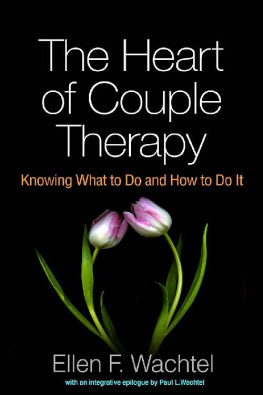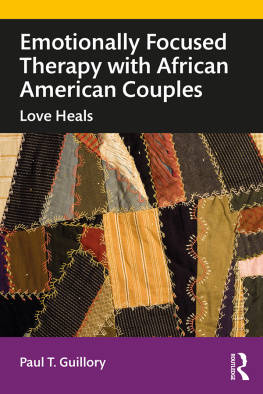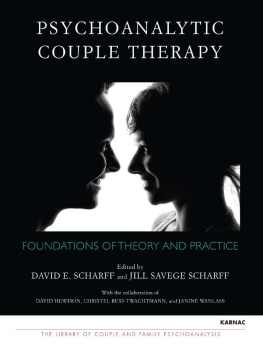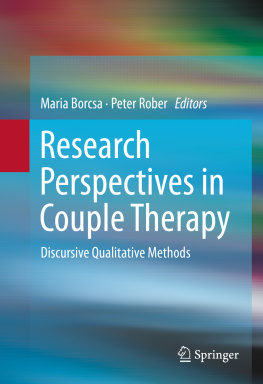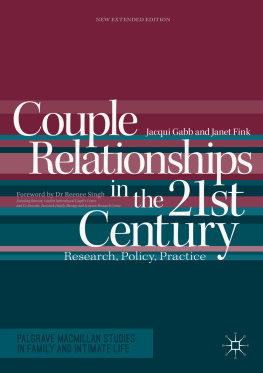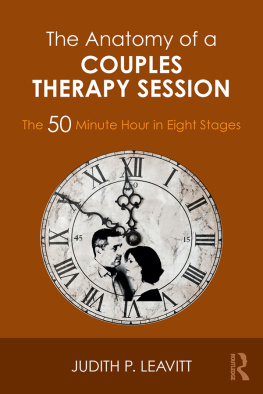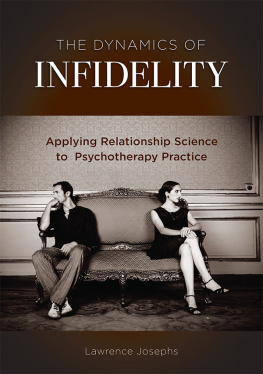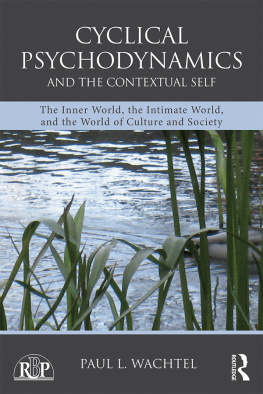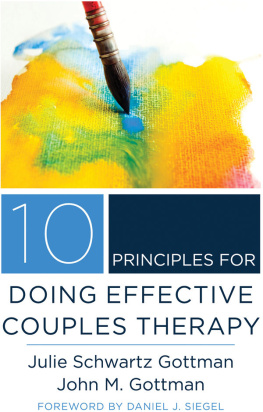Family Dynamics in Individual Psychotherapy:
A Guide to Clinical Strategies
Ellen F. Wachtel and Paul L. Wachtel
Treating Troubled Children and Their Families
Ellen F. Wachtel
The Heart
of Couple
Therapy
Knowing What to Do
and How to Do It
Ellen F. Wachtel
Epilogue by Paul L. Wachtel

T HE G UILFORD P RESS
New York London
Epub Edition ISBN: 9781462528196; Kindle Edition ISBN: 9781462528202
Copyright 2017 The Guilford Press
A Division of Guilford Publications, Inc.
370 Seventh Avenue, Suite 1200, New York, NY 10001
www.guilford.com
All rights reserved
No part of this book may be reproduced, translated, stored in a retrieval system, or transmitted, in any form or by any means, electronic, mechanical, photocopying, microfilming, recording, or otherwise, without written permission from the publisher.
Last digit is print number: 9 8 7 6 5 4 3 2 1
The author has checked with sources believed to be reliable in her efforts to provide information that is complete and generally in accord with the standards of practice that are accepted at the time of publication. However, in view of the possibility of human error or changes in behavioral, mental health, or medical sciences, neither the author, nor the editor and publisher, nor any other party who has been involved in the preparation or publication of this work warrants that the information contained herein is in every respect accurate or complete, and they are not responsible for any errors or omissions or the results obtained from the use of such information. Readers are encouraged to confirm the information contained in this book with other sources.
Library of Congress Cataloging-in-Publication Data
Names: Wachtel, Ellen F., author.
Title: The heart of couple therapy : knowing what to do and how to do it / Ellen F. Wachtel.
Description: New York : The Guilford Press, [2017] | Includes bibliographical references and index.
Identifiers: LCCN 2016031560 | ISBN 9781462528172 (hardback : alk. paper)
Subjects: | MESH: Couples Therapymethods
Classification: LCC RC488.5 | NLM WM 430.5.M3 | DDC 616.89/1562dc23
LC record available at https://lccn.loc.gov/2016031560
To two very special couples:
Karen Wachtel and Sameer Parekh
Kenneth Wachtel and Margaret Noel
Ellen F. Wachtel, PhD, JD, has a private practice in individual and couple therapy in New York City and is on the adjunct faculty of the Ackerman Institute for the Family. For many years Dr. Wachtel worked with Physicians for Human Rights and HealthRight International doing evaluations of people seeking political asylum, and she has mentored other psychologists volunteering with these organizations. Her books include We Love Each Other, But... : Simple Secrets to Strengthen Your Relationship and Make Love Last. She gives workshops on couples and families in the United States and internationally.
A big thank-you goes to Jim Nageotte, Senior Editor at The Guilford Press, for stimulating my thinking about what kind of book about doing couple therapy I wanted to write. Without his encouragement, this book would never have been written. Thanks too to Barbara Watkins at Guilford for her very helpful suggestions regarding the organization of the chapters.
The therapists who took the courses Ive given at the Ackerman Institute for the Family also contributed valuably by challenging me with many thought-provoking questions, the answers to which form the foundation of this book.
Most of all, I want to thank my husband, Paul. Expressing my appreciation of him is a difficult task. Where do I start? When he helped me not be overwhelmed with anxiety as I started Harvard Law School? Or when he supported me in every possible way when I decided to give up the practice of law and become a psychologist? Or when he encouraged me to give talks and teach despite my fear of public speaking? Every step of the way hes been the voice of Yes, you can. And so too with this book. He urged me to write it, wrote the epilogue himself, and spent much of a vacation reading a first draft and giving me exceedingly perceptive feedback. But in the end, my appreciation for Paul is not for the myriad ways hes helped me but for who he isan incredibly warm, smart, supportive man who still, so often, makes me laugh out loud with his puns and quirky comments. So, thank you, Paul, for being the love of my life!
Contents
1
Dilemmas and Choices in Couple Therapy
D oing couple therapy isnt easy. Even experienced couple therapists generally acknowledge that there are some couples with whom the work takes a serious toll emotionally; and even with less difficult couples, its a not uncommon experience for therapists to feel at a loss and uncertain about whether anything they are doing is or ever will be helpful. Self-doubt often seems to come with the territory when it comes to doing couple therapy. So, when I sometimes say in conversations that I really enjoy working with even highly challenging couples, some of my colleagues look a bit surprised. I quickly clarify that its not that I never have that stumped, What do I do now? feeling, but just that Ive developed methods of working that generally seem to keep things moving in a positive direction.
The ideas in this book derive from numerous conversations with numerous peoplestudents, friends, colleagues, my daughter (also a psychologist), and of course my husband, Paul Wachtel, himself a leading integrative therapistwho are curious about the specifics of what I actually do that might be similar or different from their own work. My aim in this book is to share with you in detail the methods that I have developed and my particular integration of theoretical perspectives that seems to make the therapy not only effective, but often actually quite enjoyable for both me and the couple.
I remember how hard doing couple therapy felt in the early years of my practice. To be in the presence of so much despair, frustration, anger, and contempt could leave me feeling as hopeless as the couple. Sometimes sessions seemed to go from bad to worse. After seeing some couples my head would be spinning and Id wonder if I were really cut out for this work. It seemed so much harder than individual therapy and Id feel so terrible when the tensions in the session hadnt been resolved and people left the office as upset as or perhaps even angrier than when they came in. Of course, this didnt happen with all the couples I saw or I would, in fact, have called it quits.
But after I had done couple therapy work for several years, I realized that I actually was finding this part of my practice more and more satisfying and that it was now quite rare for me to be so discouraged. In fact, I began to look forward to the sessions with the types of couples whom I had previously regarded as difficult because being able to help them turn the relationship around was so rewarding. Some of the change, Im sure, came from simply having more experience. But I think a good deal of my increasing success in helping couples came from the fact that my work began to be more integrative, as did the work of many others in the couple and family therapy field (E. F. Wachtel, 1992, 2004; Sheinberg & Fraenkel, 2000; Fraenkel & Pinsof, 2001; Sheinberg & Brewster, 2014; Nielsen, 2016; Lebow, 1997; Pinsof, 1995; Gerson, 2009; Pitta, 2015; Feldman, 1992). Over time I gradually started to incorporate into my systemic orientation more cognitive, behavioral, and psychodynamic thinking and interventions. What I am presenting to you in this book is not a finished product. To this day, my work with couples continues to evolve as I incorporate experiential (Goldman & Greenberg, 2013; Greenberg & Goldman, 2008; Greenberg & Johnson, 1988; Wile, 2002) and attachment approaches (Johnson, 1996; Johnson, Makinen, & Millikin, 2001; Goldner, 2014), as well as information from neuroscience (Fishbane, 2013). My hope is that this book will be helpful to readers in their own efforts to meld new methods and perspectives into their work. It is meant to describe
Next page
